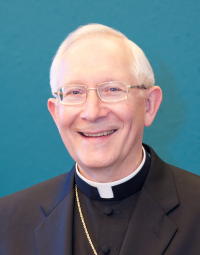
Archbishop Leonard P. Blair
Pope Francis has been quoted as saying that today we live, not just in “a changing world,” but rather in a “world of change.” Nowhere is this more evident than in the turmoil we see around us regarding the very identity of the human person created male and female, reflecting a God-given complementarity that is ordered to marriage and procreation.
With the civil legalization of homosexual “marriage” and all that that entails, a “rainbow” culture has arisen which increasingly poses grave challenges to the social order and to religious liberty. And while we cannot accept many of its tenets, neither can we ever accept unjustdiscrimination, or condone deplorable acts of violence, against homosexual persons which can never be justified under any circumstances.
In 1986 the Congregation for the Doctrine of the Faith, headed by the future Pope Benedict XVI, said that the Church refuses to consider someone as a “heterosexual” or a “homosexual,” insisting instead that every person’s fundamental identity is as a “creature of God and, by grace, his child and heir to eternal life.” The U.S. Bishops echoed this affirmation in 2006, stating that those with homosexual inclinations should not be encouraged to define themselves primarily in those terms. And although sometimes misinterpreted or misunderstood, Pope Francis echoes this same thinking in what he says about homosexual persons.The “Concluding Report” of our Hartford Archdiocesan Synod 2020: Grow & Go includes the following summary: “In today’s sexual revolution, we affirm the need of our local church to minister and offer effective pastoral care to those who experience same-sex attraction or other forms of sexual identity or expression that are not in keeping with what the Church believes and teaches. … In the circumstances of today the Church is also challenged by a civil redefinition of the very reality of marriage between one man and one woman and by the need to provide pastoral care to persons who self-identify sexually in ways that do not correspond to what the church believes and teaches about the human person created as male or female. This presents an enormous challenge not only for persons in this situation, but also for society and the church, which has no desire to spurn them but rather to provide pastoral care and spiritual support even as she challenges them with her teaching”.
A fundamental way that we in the Church can meet these challenges is by providing pastoral support to men and women experiencing same-sex attractions who have chosen to live a chaste life. Today’s world says that chastity is neither healthy nor possible, but faith and human experience tell us otherwise. Departure from the Church’s teaching, or silence about it in an effort to provide pastoral care, is neither caring nor pastoral.In Connecticut we are blessed with the work of Courage Inter-national. Founded in 1980 by the late Father John Harvey, OSFS, this apostolate has since expanded to over 175 Courage chapters worldwide. At the heart of this ministry is an understanding of the human person based on faith and reason, and the place of sexuality in human life.If you or someone you know experience same-sex attraction, I invite you to contact the Courage Chapter in our archdiocese. The chaplain, Father Eduar Gutierrez, can be reached by a dedicated phone line (860.836.6690) or by email fr.gutierrez@aohct.org. During this month of May honoring the Virgin Mary, please join me in praying for a renewal of the virtue of chastity, whatever our state in life. In the words of the Catechism: “Chastity means the successful integration of sexuality within a person, and thus the inner unity of a person in his or her bodily and spiritual being. Sexuality…becomes personal and truly human when it is integrated into the relationship of one person to another, in the complete and lifelong mutual gift of a man and a woman.”
